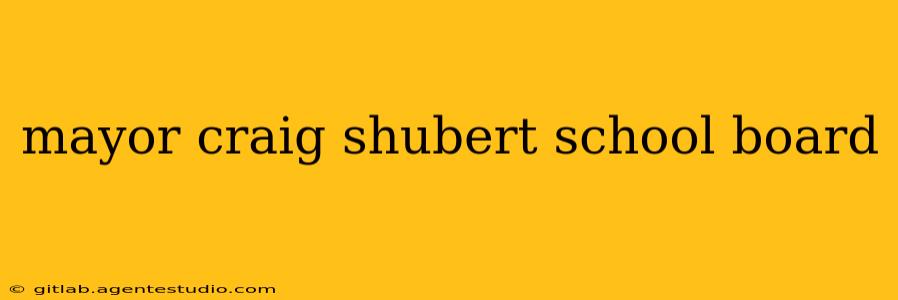Mayor Craig Shubert's relationship with the school board is a crucial aspect of [City/Town Name]'s local governance. Understanding the dynamics between these two powerful entities is vital for any engaged citizen. This article will explore the intricacies of their interactions, highlighting key areas of collaboration, conflict, and the overall impact on the community. We will delve into specific examples to provide a comprehensive picture of this vital relationship.
The Structure of Power: Mayor, School Board, and the Community
Before diving into specifics, it's essential to understand the separate yet intertwined roles of the Mayor and the School Board. The Mayor, as the head of the city's executive branch, is responsible for overseeing the general operations and budget of the municipality. The School Board, on the other hand, is an independent body responsible for the management and oversight of the public school system within the city limits. While separate, their responsibilities often overlap, particularly when it comes to budget allocation, infrastructure projects affecting schools, and community well-being.
Areas of Collaboration: Where Interests Align
Despite their distinct roles, the Mayor and the School Board frequently find common ground. Key areas of collaboration often include:
-
Budget Allocation: The city budget often includes significant funding for the school system. Negotiations between the Mayor and the School Board regarding budget priorities are crucial for the success of both entities. This collaborative process involves detailed discussions about resource allocation, prioritizing programs, and ensuring efficient use of taxpayer funds.
-
Infrastructure Projects: Projects impacting school infrastructure, such as road improvements near schools or renovations to school buildings, often require cooperation between the city and the school board. This necessitates joint planning, resource sharing, and efficient project management to minimize disruption and maximize the benefit to the community.
-
Community Initiatives: Both the Mayor's office and the School Board often collaborate on community-based initiatives aimed at improving the lives of residents. Examples might include after-school programs, youth development initiatives, and community outreach programs that benefit both students and the wider community.
Areas of Potential Conflict: Navigating Disagreements
While collaboration is vital, disagreements between the Mayor and the School Board are inevitable. Understanding these potential points of friction is crucial for fostering transparency and accountability. Some common areas of conflict include:
-
Budget Disputes: Disagreements over budget allocations can be significant. The Mayor may prioritize certain city services over school funding, leading to tension and potential compromises. Understanding the rationale behind budget decisions from both perspectives is vital for the community.
-
Policy Differences: Differing philosophies on education policy can create friction. The Mayor's office might advocate for certain policies that the School Board opposes, leading to debates over curriculum, school discipline, or other education-related issues. Open dialogue and community engagement can help bridge such divides.
-
Infrastructure Prioritization: Decisions regarding infrastructure investments can also lead to conflict. If the city prioritizes certain projects over school-related improvements, it can create tension and require careful negotiation between the two bodies.
Analyzing Mayor Shubert's Specific Actions and Their Impact
To gain a deeper understanding of the relationship between Mayor Craig Shubert and the school board, we need to examine specific instances of their interactions. [This section requires detailed examples of specific actions taken by Mayor Shubert and the school board's responses. These examples should be sourced from credible news articles, official meeting minutes, or other verifiable documentation.] This section will offer a detailed analysis of these instances, examining the context, the outcomes, and their overall impact on the community.
Conclusion: Fostering a Collaborative Future
The relationship between Mayor Craig Shubert and the school board is complex and multifaceted. While disagreements are inevitable, open communication, transparency, and a shared commitment to the community's well-being are crucial for effective governance. By understanding the dynamics between these two powerful entities, residents can better engage in local politics and contribute to a more vibrant and thriving community.
Disclaimer: This article provides an overview of the relationship between Mayor Craig Shubert and the school board. It is not intended as an exhaustive analysis and relies on publicly available information. For the most up-to-date information, please consult official city and school board records.

